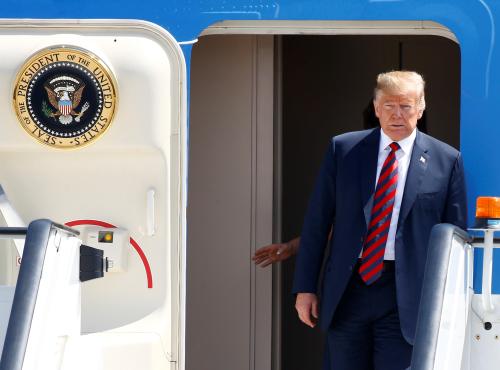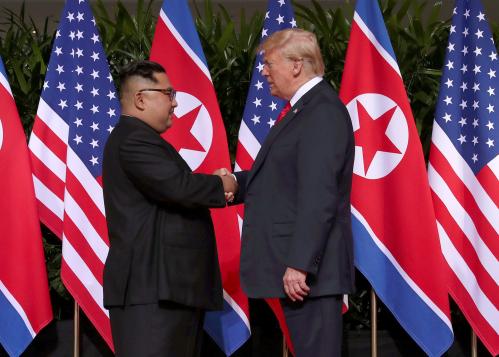Michael O’Hanlon offers a few words of counsel for those who find this particular president deeply unsettling. This piece originally appeared in USA Today.
When Donald Trump tweets in all caps threatening Iran with “CONSEQUENCES THE LIKES OF WHICH FEW THROUGHOUT HISTORY HAVE EVER SUFFERED BEFORE,” it is safe to say that the blood pressure of millions of Americans jumps to unhealthy levels. Trust me when I say this, because I am a doctor, well, not that kind of doctor, I am just the Ph.D. kind, but it can’t be good for this to happen to us over and over again.
Obviously, I am not a Trump supporter, but I do hope to be a Trump survivor. In that light, I would offer a few words of counsel for those who find this particular president deeply unsettling.
As a person who grew up in a part of the world where lots of folks support President Trump (western New York state), and who, like many, laments the partisan division in the country today (recognizing that President Trump often does his best to exacerbate it), I do feel like there are ways to approach this presidency that can, at a minimum, help lower the blood pressure.
Here are a few suggested guidelines:
- Recognize why Trump won. Mostly, it wasn’t about deplorables, and it doesn’t prove that we’ve entered a “post-fact” society. Although there were many troubling elements to his campaign, in my eyes he won because he tapped into a deep malaise with the state of the country, particularly among middle-class and working-class voters who sensed that the Jeb Bushes and Hillary Clintons of the world weren’t speaking to their lives or their needs. Lots of Trump’s message was about economics, about financial and personal security. Yes, it was about immigration, coastal elites, and culture, too. Trump gets lots of facts wrong but he got the malaise, frustration, and anger fact right. So did Bernie Sanders, by the way, so this is not a purely partisan matter.
- Observe that on national security, Trump is less radical so far than often alleged. Don’t get me wrong. President Trump scares me half the time on foreign policy matters too, just like for many others. His brinkmanship with North Korea and with Iran (again this week); his frequent injurious words towards allies in Europe and North America; his friendliness towards certain strongmen, Vladimir Putin in particular—these are all regrettable. But there has emerged a pattern in his national security policymaking. He begins with a bold, disruptive, often angry idea—for example, casting doubt on whether he would protect our allies from attack, threatening to carpet bomb or waterboard our enemies, promising apocalyptic wars, and so on. But then his national security team helps him consider his actual options, and he takes a more moderate course of action. A year and a half into his presidency, he is committed to protect Japan and South Korea as well as NATO allies (a recent unfortunate comment about NATO’s newest member, Montenegro, notwithstanding), to stay the course in Afghanistan (though many Americans probably wish he wouldn’t), to be careful about pulling out of Syria (at least for the moment) even though ISIS is largely on its heels there.
By the way, many of the nation’s top academics in foreign policy at places like Harvard, the University of Chicago, and MIT support the more minimalist kind of foreign policies that Trump campaigned on. I believe they are more wrong than right. But the fact remains that Trump is in good company. Indeed, he may have evolved to a much more moderate place than many of them. Admittedly, my analysis may not apply as well to a future crisis, or to trade and economic policy, where things are getting hotter and the jury is still out, or to immigration policy, where Trump has to my mind failed to uphold the melting-pot principles upon which this country was founded. Again, I am not trying to defend or support President Trump here — only to lower somewhat the anxiety level of those who oppose him.
- Understand why Trump goes easy on Putin. To be sure, President Trump is too nice to Vladimir Putin of Russia, an aggressive and petulant man who has also suppressed his own nation’s democracy (and perhaps had a hand in several assassinations within Russia). But rather than getting wound up too much over things like the July 16 Helsinki summit and press conference, where Trump pulled the rug out from under U.S. intelligence agencies before partially making amends later, critics should bear in mind two things. First, Trump, a proud man, will never lead the charge on criticizing Russia for interfering in the 2016 election. To do so would tarnish his victory over Secretary Hillary Clinton in his own mind. Second, Trump’s view that U.S.-Russian relations are dangerously poor, and in need of rethinking, is more right than wrong. Unfortunately, because of how he handles the election interference issue in particular, Trump may not wind up being in a position to do much to improve relations with Russia. He is not a credible vehicle for doing so at present. But he is not wrong to want to make the attempt.
- Finally, don’t be shocked about who Trump is anymore. Donald Trump is a maverick, a populist, a trash talker, a combative tweeter, and a New York cutthroat businessman. Even his supporters will agree with most of that. So those who oppose him should at least stop being surprised by his rhetoric. Often, he winds himself up into a bit of a tizzy, partly because of his temperament, partly for political effect. Usually, he also winds himself down too. But not always. So his opponents should save their greatest worries for when Trump does not wind down, when he consistently and dangerously keeps pushing a radical line, and when his policies reinforce his rhetoric (say, on environmental policy). By contrast, with the occasional outbursts, it’s usually better just to let those go, and not take them all equally seriously.
I don’t mean to suggest that Trump’s political opponents should weaken their efforts to oppose his policies they dislike, or to run against him with vigor in 2018 and 2020. And admittedly, I don’t know if any of the above ideas will help reduce his critics’ anxieties as much as a real doctor’s Rx.
But I can say that they do help me.





Commentary
A doctor’s guide to surviving Trump
July 25, 2018